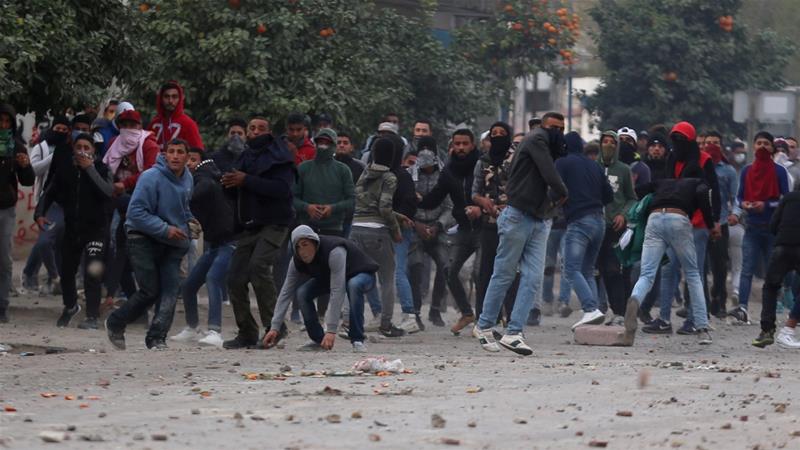Home » Middle East »
Tunisia: Protests after journalist sets himself on fire
Abderrazak Zorgui posted a video online before his self-immolation in the city of Kasserine calling for a revolution.
Protests erupted in Tunisia after the death of a journalist who set himself on fire to protest against economic hardship in the North African nation, prompting clashes with police.
Abderrazak Zorgui, a 32-year-old journalist, posted a video online before his self-immolation in the city of Kasserine, describing his desperation for a revolution over poor living condition and corruption.
He expressed his frustration at unemployment and the unfulfilled promises of Tunisia’s 2011 Arab Spring revolution.
Authorities said Zorgui died of his injuries on Monday soon after being taken to hospital.
His action triggered a protest on Monday night in Kasserine that degenerated into violence, with police firing tear gas to disperse crowds blocking the main street, setting tyres ablaze and throwing stones at police.
Interior ministry spokesperson Sofiane Zaag said on Tuesday that six police officers were injured and several people arrested in the protest.
A new protest was held on Tuesday night in Kasserine, with new tensions with police, and other actions were reported elsewhere.
Authorities also deployed reinforcement on the main streets of Kasserine, 270km from the capital, Tunis.
“For the sons of Kasserine who have no means of subsistence, today I start a revolution. I am going to set myself on fire,” Zorgui said in the video published before his death.
In late 2010, a similar self-immolation by Mohamed Bouazizi, a street vendor lamenting unemployment, corruption and repression, led to nationwide protests fueled by social media that brought down Tunisia’s long-time authoritarian President Zine El Abidine Ben Ali in 2011.
That ushered in democracy for Tunisia and unleashed similar movements around the Arab world.
Zorgui’s funeral was held on Tuesday in Kasserine, which has come to symbolise Tunisia’s economic problems and social tensions.
‘Lack of hope’
Unemployment and poverty are high, and the area has struggled for years against armed groups in the nearby mountains who are linked to al-Qaeda and the Islamic State of Iraq and the Levant (ISIL, also known as ISIS).
The Tunisian National Journalists’ Union called for demonstrations and a possible strike in response to the journalist’s death. In a statement, it accused the state of contributing to Zorgui’s death by not cracking down on corruption. The union said he died protesting “difficult social conditions…and lack of hope,”
Tunisian reporters expressed solidarity with Zorgui, lamenting precarious conditions for freelancers with no legal protections and low pay amid Tunisia’s struggling economy.
“The reasons for this young man’s suicide are poverty and marginalisation, as well as the fragile situation of most journalists,” said Latifa Labiadh of radio station Amal.
Despite the country’s democratic transition after Ben Ali’s removal and a recent return to economic growth, authorities are still struggling to improve poor living conditions.
Inflation fueled by the devaluation of the Tunisian dinar and persistent unemployment sparked protest across the country last January.
Inside Story
How will Tunisia recover from its economic woes?
Source: Read Full Article





